Photographs: Reuters Praful Bidwai
Just as the United Progressive Alliance government seems set, awkwardly and belatedly, to concede the Opposition's demand for a Joint Parliamentary Committee on the 2G-telecom spectrum scam, it has been hit by another scandal, this time involving the Department of Space and a private company, Devas Multimedia Private Limited.
DoS subsidiary Antrix Corporation undersold to Devas electromagnetic spectrum from the 2.5 GHz frequency band, called S-band.
The presumptive loss to the exchequer, Rs 2 lakh crore (Rs 2 trillion), exceeds the upper end of the range (Rs 1.76 lakh crore, or Rs 1.76 trillion) estimated by the Comptroller and Auditor General of India for the damage caused by the 2G-scam.
The disclosures have sullied the reputation of yet another Holy Cow of the Indian science and technology (S&T) establishment.
. . .
Scams, high prices, pro-rich policy could maim UPA
Photographs: Reuters
The Indian Space Research Organisation, long lionised for successful launching of many rockets and satellites, now joins other S&T institutions of dubious integrity, which evade public scrutiny by taking cover behind technical 'expertise' and abuse their power.
These include the Council of Scientific and Industrial Research and Indian Council of Agricultural Research, which run chains of highly bureaucratised and under-performing laboratories.
The list also includes the Department of Atomic Energy and the Defence Research and Development Organisation, which have the twin distinction of being pampered with budgets in the $1-billion bracket, and of having never completed a project on time and without huge cost overruns.
DoS has certainly performed better than the DAE, but follows the same organisational model and evades real public accountability.
. . .
Scams, high prices, pro-rich policy could maim UPA
Photographs: Reuters
It emerges that ISRO sold 70 megahertz (MHz) of spectrum to Devas for a song for unfettered commercial exploitation through two customer-specific satellites.
This was a deplorably collusive arrangement. Devas was floated by former ISRO officers. Its top executives used their contacts in Antrix and DoS to extract a patently skewed deal.
Devas was to pay Antrix just over Rs 1,000 crore (Rs 10 billion) in return for ISRO's contractual obligation to design, build and launch two satellites to make available to Devas the S-band spectrum for commercialising a range of multimedia broadband services across India.
The CAG estimates the true value of the spectrum at over Rs 2 lakh crore. So great was this bonanza that Devas could command a premium of Rs 1.14 lakh (Rs 114,000) on each of its Rs 10 (face value) shares when it sold 17 per cent of its equity to Deutsche Telekom in 2008.
. . .
Scams, high prices, pro-rich policy could maim UPA
Photographs: Reuters
The key to this manna from heaven lies in some special features of the S-Band. According to a telecom industry report, the S-band is unique: "As mobile voice and data traffic increases, wireless operators around the world will require additional spectrum. However, as a finite public commodity, few bands remain available for new allocation to mobile wireless services and even fewer exist for global harmonisation of wireless spectrum assets. The 2.6 GHz band is one exception. The band provides an opportunity to meet rapidly rising demand for capacity to deliver mobile broadband services on a widespread, common basis across the world."
So Devas knew it had struck gold thanks to ISRO's munificence. ISRO of course knew how much the spectrum was worth. But it didn't inform the Union Cabinet about the deal.
It also kept it a secret from the Department of Telecommunications and Telecom Regulatory Authority of India. It's only when an insider blew the whistle on it that the murky deal came to light in late 2009. ISRO chief K Radhakrishnan now admits that ISRO failed 'explicitly' to inform the Cabinet of the deal.
Like in the 2G scam, the S-band spectrum sale was also made without competitive bidding. But in this case, ISRO scientists became salesmen and suppliers to their own organisation and took it for a ride.
. . .
Scams, high prices, pro-rich policy could maim UPA
Photographs: Reuters
Perhaps the worst culprit was Devas chairman MG Chandrasekhar, ISRO's former scientific secretary, who later also headed WorldSpace satellite radio operations in India. The specific links between the two organisations need to be further investigated.
Apart from causing a huge financial loss, the Antrix-Devas deal would have robbed many Indian public organisations of access to spectrum, including the defence services, BSF, CISF, the Coast Guard and Indian Railways, all of which had pitched for spectrum within the S-band for various purposes including strategic communications and tracking trains.
Devas would have sold/leased the spectrum for high-definition television broadcasting, telecom services, mobile TV, broadband Internet, and navigation, to make a killing.
The S-band spectrum would have appreciated in value, as it's virtually the only band left from which a substantial chunk of spectrum can be allocated to telecom companies.
. . .
Scams, high prices, pro-rich policy could maim UPA
Photographs: Reuters
ISRO and DoS compounded their malfeasance by trying to bury the report of the DoS's one-man (BN Suresh) committee to inquire into the Devas-Antrix deal.
According to media reports, ISRO overruled the committee's mid-2010 recommendation to annul the contract and airbrushed the various irregularities revealed. The Devas contract has been cancelled, but the company is threatening to sue the government.
The UPA too has earned no credit by appointing a committee to investigate the contract, consisting of former bureaucrat B K Chaturvedi and Roddam Narasimha, member of the Space Commission, DoS's policy-making body.
Chaturvedi was a Commission member by virtue of being the Cabinet Secretary, and had approved the deal. Narasimha's too is a case of conflict of interest.
. . .
Scams, high prices, pro-rich policy could maim UPA
Image: Prime Minister Manmohan Singh.Photographs: Reuters
This is the latest in an unending series of recent scams, including the Commonwealth Games, Adarsh Housing, 2G-spectrum and money laundering, which have revolted the public and damaged the UPA's credibility.
Prime Minister Manmohan Singh could have partially restored credibility had he broken the Congress's alliance with the DMK at the government level and also sacked some tainted Congress and Nationalist Congress ministers.
After all, (former telecom minister) A Raja wasn't the sole corrupt DMK minister. And Vilasrao Deshmukh, Kamal Nath and Praful Patel all have less-than-wholesome reputations.
Deshmukh has been indicted for shielding loan-sharks who have driven farmers to suicide in his home state (Maharashtra).
. . .
Scams, high prices, pro-rich policy could maim UPA
Photographs: Reuters
He was removed as its chief minister for strutting about the Taj Mahal Hotel soon after the November 2008 attacks, with a film-maker in tow.
In the latest reshuffle, Manmohan Singh elevated Deshmukh to rural development, a ministry with a huge budget which ought to be used for the benefit of the poor.
This shows deep cynicism, as do Nath's and Patel's new portfolios. Merits apart, the UPA lost a course-correction opportunity.
The government has failed to provide the public any relief from rising prices, in particular high food prices, while parroting homilies about how inflation will level off, by October, November, January . . .
. . .
Scams, high prices, pro-rich policy could maim UPA
Photographs: Reuters
People are relieved that onion prices have at last fallen. But Agriculture Minister Sharad Pawar's first reaction is to allow onion exports, although recent exports of onion and grain were a major cause of the domestic price rise.
Exporting an annual average of 7.9 million tonne of foodgrains in recent years wasn't wise. But no lessons were learnt. Why should they be learnt when there's a chance to make an illegal 10 per cent on exports?
Meanwhile, the UPA continues to pursue pro-rich, pro-corporate policies while imposing destructive and predatory industrial, mining and dam projects on the poor in violation of the law.
The UPA came to power by seriously pledging a commitment to inclusive growth and equity. It reconstituted the National Advisory Council to help it formulate policies and programmes that would provide India's disadvantaged people food security, basic healthcare, right to education and other amenities.
. . .
Scams, high prices, pro-rich policy could maim UPA
Photographs: Reuters
The NAC was meant to be fully autonomous of the government. But the government is messing around with it. Manmohan Singh first asked the NAC to shed its insistence on a universal Public Distribution System for food security.
The NAC formulated a two-tier structure of entitlements and prices to cover 90 per cent of the rural population and 50 per cent of city-dwellers.
But Manmohan Singh wanted this whittled down further. He appointed the Rangarajan Committee to write an adverse report. The idea is to scuttle a strong PDS which can provide affordable food to underprivileged Indians.
Why, the government also rejected the NAC's demand that work under the National Rural Employment Guarantee Act should be paid the statutory minimum wage!
. . .
Scams, high prices, pro-rich policy could maim UPA
Photographs: Reuters
This violates several Supreme Court injunctions, which say the minimum wage must be paid "in any event". It sets "the lowest limit below which wages cannot be allowed to sink in all humanity". Paying lower wages amounts to "forced labour".
Manmohan Singh is quibbling over a few hundred crores (millions) for the poor, but has no compunctions in giving away Rs 500,000 crore (Rs 5 trillion) in tax-breaks and subsidies to corporations and exporters. This is a dangerous trend.
If the UPA continues to be partisan to the rich, and ignores the poor majority, it will forfeit its legitimacy in the eyes of the people and invite their wrath -- the way the National Democratic Alliance did via its 'India Shining' campaign in 2004.
As the crucial Budget session of Parliament begins, the UPA has a major chance to correct course. If it wastes it, it risks disaster.



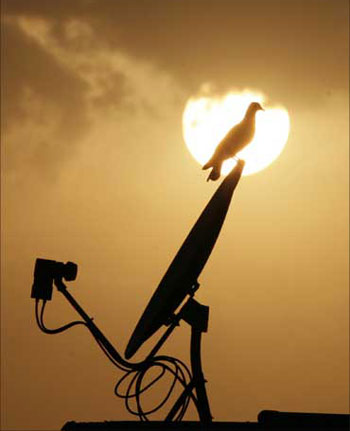


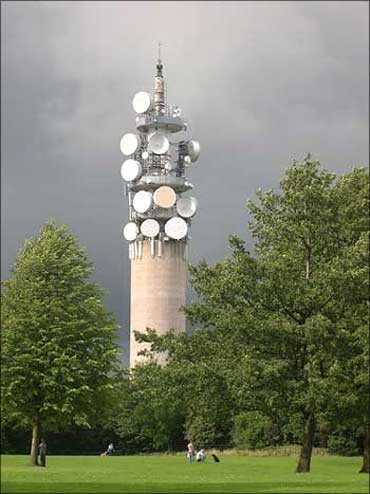
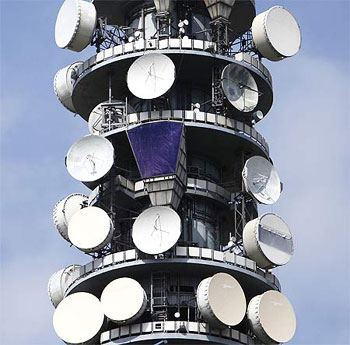
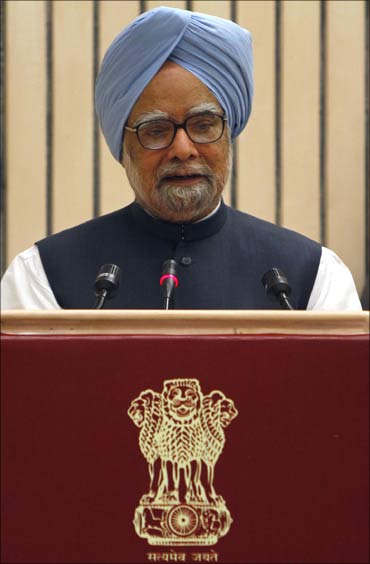
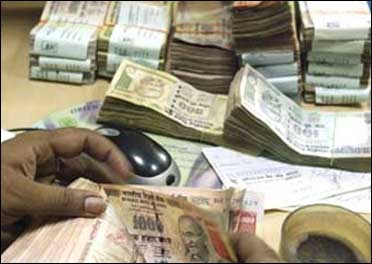

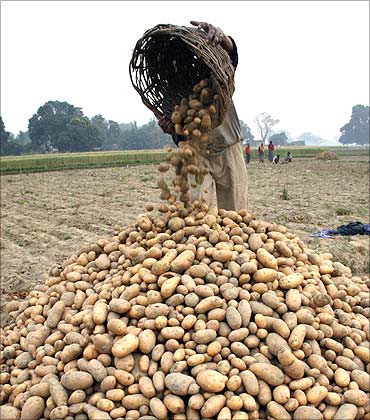
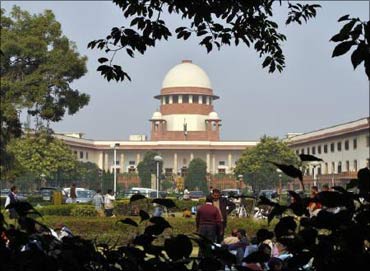
article